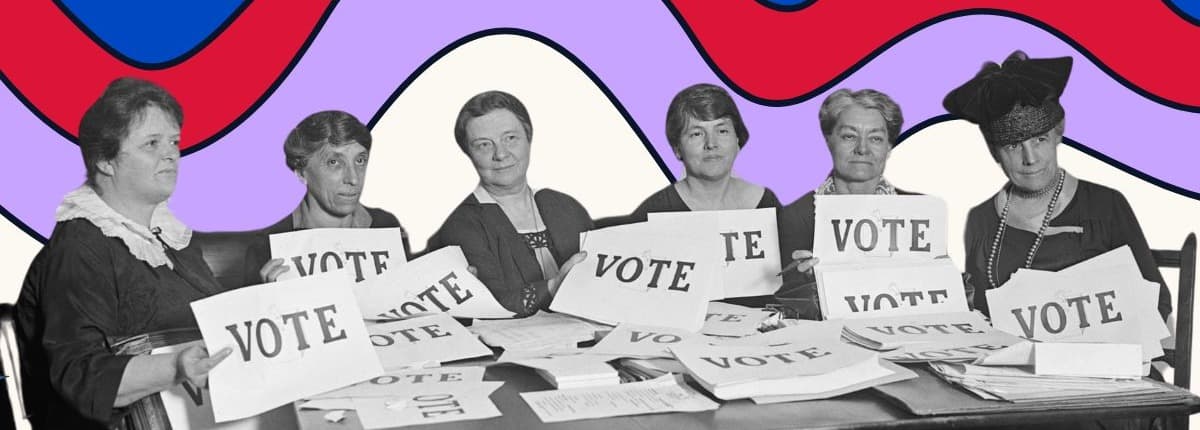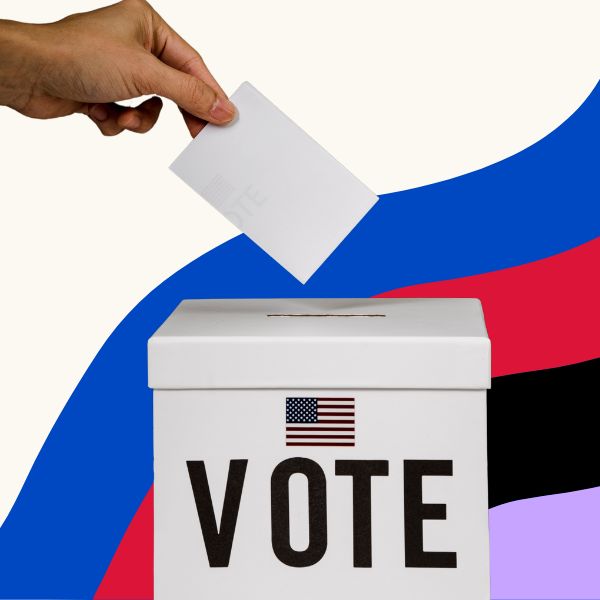
Women in Politics: A Timeline of Progress and Power
Women make up 50.5% of the U.S. population, yet they hold only 28.2% of seats in Congress. While women's influence and participation in politics have made remarkable progress over the years, they still have a ways to go. Gender exclusion persists, stagnating women's political influence and preventing women from having equal access to government leadership roles.
Historically, women have played pivotal roles in the American political system, and the efforts of early women’s rights leaders helped pave the way for modern women to do what was once unthinkable: run and nearly win a presidential bid.
By understanding the historical achievements of women in politics and the ways they’ve altered and improved our very government, we can see the crucial role women play in advocating for social change, shaping policies, and advancing societies worldwide.
A Brief History of Women in Politics
From the early suffragist movements to Kamala Harris’ 2024 presidential run, women’s history with politics is a long line of hard-fought battles against a system and culture notoriously wary of change. Tracing through the history of female political leaders, we can appreciate the seemingly insurmountable barriers women have broken through and better understand how far we must go to create a truly representative democracy in the United States.
The Suffragists
Although women have been influencing and shaping politics long before earning the right to vote, the early suffragist movements of the late 19th and early 20th centuries were a crucial turning point in gender exclusion. With the adoption of the 19th Amendment to the U.S. Constitution, women gained the right to vote and the opportunity for greater involvement in the political arena.

The suffrage movement began with Elizabeth Cady Stanton, Susan B. Anthony, and Lucretia Mott in the late 1840s:
1848: The Seneca Falls Convention
The Seneca Falls Convention was the first women’s rights convention in the United States. It allowed anti-slavery activists to discuss the status of women in America and craft a Declaration of Sentiments to begin vouching for women’s right to vote, equal employment opportunities, and equal legal status in marriage and divorce.
1866: Elizabeth Cady Stanton’s Bid for Congress
Emboldened by the end of the Civil War, Stanton ran for the U.S. House of Representatives despite still not having the legal right to vote. She ran as an Independent, and while she only received 24 votes, she paved the way for future women and Independents to run for office.
1872: Victoria Woodhull Vies for the Presidency
Stanton inspired women across the country, and Victoria Woodhull set her sights on the top seat in the government. She became the first woman to run for president, still without the right to vote. As the Equal Rights Party candidate, she ran against Republican Ulysses S. Grant and Democrat Horace Greeley. The Equal Rights Party was a vital early third-party movement. Today, organizations like GoodParty.org continue this tradition, helping Independent candidates — many women — navigate the political landscape without relying on major party support.
LEARN MORE: Political thought goes far beyond Republican, Democrat, or Independent. Explore the diversity of political ideologies.
1884: Lawyer Belva Lockwood Runs for President
The Equal Rights Party made another push for the presidency with Belva Lockwood, who also ran again in 1888. Lockwood was one of the first female lawyers in the United States and was the first woman to argue a case before the Supreme Court in 1880.
1887: Susanna Salter Becomes First Female Mayor
While some were trying to tackle women’s rights from the top down, others looked for ways to make a difference on a local level. In Argonia, Kansas, Susanna Salter became the first female mayor in the United States, building the foundation for other women to take positions of power in their communities.
LEARN MORE: Getting involved in local politics allows you to make a tangible difference in your community and beyond.
1888: Oskaloosa, Kansas Has an All-Woman Government
While Belva Lockwood was running for president for the second time, Kansas became a beacon of hope in the women’s rights movement. Oskaloosa, Kansas, elected a female mayor and an entirely female council, creating the first known all-woman government in the country.
1894: Cressingham, Holly, and Klock State Legislature Win
Three women, Clara Cressingham, Carrie C. Holly, and Frances Klock, became the first to serve in a state legislature in the United States. They won seats in Colorado’s House of Representatives.
1896: Cannon Becomes the First Female State Senator
Following the historic win in Colorado, Martha Hughes Cannon won a seat in Utah’s State Senate.
1916: U.S. Congress Sees First Female Representative
After big wins in local and state elections across the country, Jeannette Rankin made a breakthrough at the federal level, becoming the first woman elected to the U.S. House of Representatives. She served in Congress as a representative for Montana from 1917 to 1919 and 1941 to 1942, both times being a solo voice against the United States entering world wars.
1920: Women’s Suffrage Win
Seventy-two years after the first women’s rights convention, Congress ratified the 19th Amendment, giving women the right to vote. Additionally, activists in the suffrage movement created the League of Women Voters to encourage more women to participate in politics.
Post-Suffrage Women Leaders
After fighting for and earning the right to vote, women became even more involved in local, state, and federal politics. To summarize every win women have made in American politics after 1920 would be unthinkable.
But, a few notable accomplishments of women in politics since the historic 19th Amendment win include:
Cora Belle Reynolds Anderson became the first Native American woman to serve in a state legislature in 1924.
Nellie Tayloe Ross won a 1925 election in Wyoming, making her the first female governor in the United States.
Frances Perkins was the first presidential Cabinet member when Franklin D. Roosevelt appointed her Secretary of Labor in 1933.
Margaret Chase Smith earned a seat in the U.S. Senate in 1948 and was the first woman elected rather than appointed to the Senate. She first replaced her husband in the House of Representatives in 1940, and following her Senate win, she also briefly ran for president in 1964.
Shirley Chisholm became the first Black woman to serve in Congress in 1968. She then ran for the presidential nomination in the 1972 Democratic primaries.
Elaine Noble was the first openly gay candidate elected to a state legislature, serving two terms starting in 1975 in the Massachusetts House of Representatives.
Sandra Day O’Connor was appointed to the U.S. Supreme Court in 1981, making her the first female Supreme Court Justice.
Lenora Fulani continued the long tradition of women running as Independents and third-party candidates with her two presidential bids in 1988 and 1992.
Olympia Snowe ran in both state and federal elections. In 1994, she became the first woman to serve in both chambers of Maine’s state legislature and both chambers of the U.S. Congress.
Elaine Chao became the first Asian American woman to serve as Secretary of Labor in 2001, joining George W. Bush’s female-heavy cabinet. His cabinet included Condoleeza Rice as the first female National Security Advisor, Gale Norton as the first female Secretary of the Interior, and Ann Veneman as the first woman to serve as Secretary of Agriculture. Condoleeza Rice later became the first Black woman to serve as Secretary of State in 2005.
Hillary Clinton won the Democratic Party’s presidential primary in 2008, being the first woman to win the primary for a major political party. She later became the Democratic nominee and ran for president in 2016.
Kamala Harris got closer to the top of the political food chain than any previous woman in politics when she was elected Vice President in 2020. She was also the first Black and South Asian woman nominated by a major political party in her 2024 presidential run.
While many female politicians have helped pave the way for future generations, women in government today still face many of the same challenges, from underrepresentation to systemic biases that limit campaign funding and electability.
The State of Women in Politics Today
As much as the United States has evolved since the suffrage movement in the 1840s, we still have a long way to go if we want to catch up to the rest of the developed world. We lag behind many developed nations in terms of political participation and representation.
While women comprise 50.5% of the United States population, our governing bodies don’t reflect that ratio:
Only 28.2% of Congress is female in 2025.
Of the 50 states, only 12 have female governors.
Less than 40% of the 100 most populous cities have a female mayor.
Meanwhile, some other nations have carved out paths for increasing women’s participation in politics, ensuring women’s voices are heard at the local and national levels:
In countries like Bolivia, Belarus, Mexico, France, and India, women hold nearly 50% of elected seats.
More than 80 countries, including Brazil, Italy, Pakistan, and South Africa, have quota systems in place to ensure more equal representation atleast at local levels of government.
As of January 2024, 27 countries had elected women to the highest seat of power.
As UN Secretary-General António Guterres stated in his remarks to the Commission on the Status of Women in March 2024, “...women lead to peace. Budgets and policies must follow — with ambitious targets for women’s participation and urgent investments in women’s peacebuilding.”
How Women in Politics Shape Narratives and Create Change
In the face of societal stereotypes and cultural expectations, female political leaders have defied the odds and shattered glass ceilings. Women ran for office at all levels of government well before even having the right to vote. Women have proven their ability to lead effectively, from local city councils to the vice presidency.
Women in politics bring unique perspectives, broadening the discourse on issues like healthcare, education, and social welfare. These discussions can lead to change that betters everyone’s lives. For instance, the Lilly Ledbetter Fair Pay Act, which addresses pay discrimination, was championed by women legislators. From grassroots movements advocating for environmental protection to community initiatives addressing housing and poverty, women are at the forefront of driving positive change.
Research in the Journal of Political Sciences and Public Affairs suggests that women in government contribute to more effective decision-making. Studies found that gender-diverse politicians are also less inclined to be corrupted.
Ultimately, women in politics tend to emphasize collaboration, empathy, and consensus-building, enriching political narratives and promoting a more diverse, inclusive, and compassionate approach to governance. By improving women’s participation in political spheres, we ensure that the diverse needs of different communities are heard and addressed. We also ensure that we’re working together towards a truly representative democracy.
Where Do Women in Politics Go From Here?
America has never elected a woman to the presidency. It wasn't until Hillary Clinton's 2016 run that the United States had a viable female candidate at the top of a major-party ticket. We elected our first woman VP in 2020, exactly 100 years after women finally earned their hard-fought right to vote.
At the congressional level, Mississippi and North Dakota have never elected a woman to either chamber of Congress. Six states have only sent one woman each to the U.S. legislature: Vermont, Mississippi, Delaware, Rhode Island, North Dakota, and Alaska.

Ultimately, women's political influence increases when looking at state and local leadership positions. Women are demonstrably more influential and have a greater chance of winning local and state elections than federal elections. So, how do we encourage more women to run for office?
5 Strategies to Increase Women’s Representation in Politics
Increasing the representation and participation of women in the American political system is crucial for achieving gender equality and ensuring a more inclusive democracy. The journey for women in politics is fraught with gender biases and flawed political systems that undermine their credibility and confidence. Both systemic and cultural changes are needed to achieve a truly representative democracy in the United States.
Some steps we can take now to improve the representation of women in politics include:
1. Encourage Early Interest in Politics
Schools and community organizations can help promote political engagement among young girls. Programs teaching leadership skills, public speaking, and the basics of civics instill confidence and interest in political careers and encourage the empowerment of women in government from a young age.
2. Support Women's Political Training and Mentorship
Organizations like GoodParty.org offer training, mentorship, and resources to ignite women's political aspirations and help them navigate the political landscape. Building networks and coalitions that bring together women from diverse backgrounds can amplify their voices and increase their collective influence in the political arena.
Want to learn more? Check out our map of where GoodParty.org empowered Independent candidates to run for office and win in 2024.
3. Increase Funding Opportunities
Women often face challenges accessing campaign funding, which is crucial for running competitive campaigns. When political campaigns are won by whoever has the biggest bank account, marginalized voices don’t feel confident in their ability to run. Campaign finance reforms that level the playing field for every candidate can empower women, Independents, and people from all backgrounds to run for office.
LEARN MORE: See how publicly funded elections reduce corruption and empower marginalized candidates.
4. Implement Gender Quotas
Gender quotas ensure that at least a large minority of women are represented in political offices. More than 80 countries, including Sweden, Rwanda, and Norway, already have effective quota systems that support women's political movements and increase their participation in politics.
5. Highlight Women's Achievements and Contributions
Recognizing and celebrating women's impact on policy can inspire others. Showcasing women's role in government through successful female leaders reinforces the idea that women can and do excel in political leadership roles.
LEARN MORE: See how Jennifer Hutchinson became the first Black woman elected to a citywide seat in Rock Hill, South Carolina.
Looking Forward: The Future of Women in Politics
The throughline of women’s history in American politics is progress, determination, and the constant pursuit of equality. From the early suffrage movements to contemporary battles for representation, women continually demonstrate their ability to lead, advocate, and shape policies that resonate with the needs of diverse communities.
While challenges like gender bias and underrepresentation persist, concerted efforts from individuals, organizations like GoodParty.org, and society at large are steadily paving the way for a more equitable political landscape. Celebrating women's achievements in politics is a testament to their resilience and a call to action for greater gender parity and inclusivity.
The fight for gender equality in politics is still ongoing. We must ensure that women's voices and perspectives remain central to the democratic processes that shape our nation. To build a truly representative democracy, we must take action. Whether you’re considering running for office or looking to support Independent candidates, GoodParty.org provides the tools and resources to make real change happen.
Check out how GoodParty.org empowers Independents like you to run for office.

